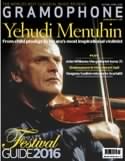Texte paru dans: / Appeared in: |
|
|
Outil de traduction (Très approximatif) |
|
|
Reviewer:
Lindsay Kemp This is the second recital disc from the young French harpsichordist Jean Rondeau. The first, a selection of Bach transcriptions, got a warm hello here (3/15), but others since have suggested that he is a player who provokes divided opinions. What seems clear, however, is that, having started on the instrument at the age of six, he has developed an affinity for it and a comfort in its presence that allow him to see in it its possibilities rather than its limitations, thus encouraging the free spirit in him. That is still a relatively rare thing among harpsichordists, and we should surely welcome it.
The repertoire he
plays here – flamboyant and exotic late-Baroque fare from Rameau and Royer –
seems a good fit for him. His agile and rock-solid finger technique means that
Rameau’s Les Niais de Sologne and Royer’s La marche des Scythes
can thrill as they should while never trampling on the gorgeous deep tone of the
magnificent instrument, an 18th-century original attributed to Donzelague and
known (after the place where it lives) as the ‘Château d’Assas harpsichord’. Yet
he can also find the poetic eloquence in Royer’s La Zaïde and
L’aimable, and Rameau’s Les tendres plaintes and (especially) the
exquisite L’entretien des Muses, but the qualities with which he achieves
that – an almost casually fluid approach to the rhythmic dislocation of
individual lines and an ability to assume ornamentation into them as if it had
always been there – are actually the ones that distinguish his performance style
across the range of these pieces. His booklet-note reveals a strong visual
imagination which likes to link these pieces to their operatic alter egos, and
he is right to claim a filmic quality for the extraordinary, fractured Le
Vertigo. And although that is not to say that he is incapable of over-egging
things – his unhurried freedom risks losing hold of momentum in places, and his
drawn-out account of Musette en rondeau surely misses the beguiling
simplicity of Rameau’s piece – there is no doubt that here is a player of
immense ability, from whom we reasonably may hope for much. |
|
|
|
|
|
Cliquez l'un ou l'autre
bouton pour découvrir bien d'autres critiques de CD |
|




